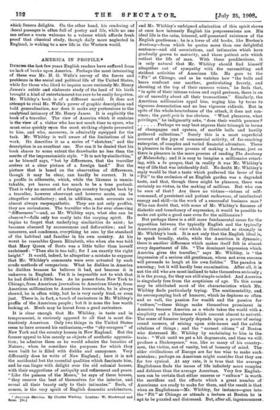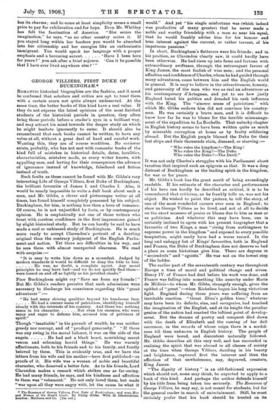AMERICA IN PROFILE.*
DUBIN& the last few years English readers have suffered from no lack of books upon America. Perhaps the most interesting of these was Mr. H. G. Wells's survey of the forces and problems in the social and political life of the United States, while for those who liked to inquire more curiously Mr. Henry James's subtle and elaborate study of the land of his birth brought a kind of entertainment too rare to be easily forgotten. Mr. Whibley's book is of a different mould. It does not attempt to rival Mr. Wells's power of graphic description and bold generalisation, nor does it make any pretensions to the analytical intimacy of Mr. Henry James. It is explicitly the book of a traveller. The view of America which it contains is the-view of a visitor who has not much time to spare, who must seize quickly upon the most striking objects presented to him, and who, moreover, is admirably equipped for the task. Mr. Whibley is well aware of the limitations of his work. He describes it as a series of "sketches," and the description is an excellent one. Nor can it be denied that his book shares to some extent the drawbacks no less than the merits of the impressionistic style. "It is not by similarities," as he himself says, "but by differences, that the traveller arrives at a clear picture of a foreign land." But the picture that is based on the observation of differences, though it may be clear, can hardly be correct. It is a profile in silhouette, which, while the likeness is unmis- takable, yet leaves out too much to be a true portrait. That is why no account of a foreign country brought back by a traveller, however observant and however acute, can be altogether satisfactory; and, in addition, such accounts are almost always unsympathetic. They are not only profiles, they are caricatures. The traveller who is for ever observing "differences "—and, as Mr. Whibley says, what else can he observe F—falls only too easily into the carping spirit. He begins to forget that underlying similarities do exist ; he becomes obsessed by excrescences and deformities ; and be measures, and condemns, everything he sees by the standard of the habitual and familiar in his own country. At his worst he resembles Queen Elizabeth, who when she was told that Mary Queen of Scots was a little taller than herself exclaimed : "Then she is too tall ; for I am exactly the right height." It would, indeed, be altogether a mistake to suppose that Mr. Whibley's comments were ever actuated by such crude methods of comparison. What he dislikes in America he dislikes because he believes it bad, not because it is unknown in England. Yet it is impossible not to wish that he had disliked a little less. As be passes from New York to Chicago, from American journalism to American liberty, from American millionaires to American humourists, he is always shrewd, he is often witty, but he is very rarely kind, or even just. There is, in fact, a touch of caricature in Mr. Whibley's profile of the American people ; but it is none the less worth looking at. Much may be learnt from a good caricature.
It is clear enough that Mr. Whibley, in taste and in temperament, is curiously opposed to all that is most dis- tinctively American. Only two things in the United States seem to have aroused his enthusiasm,—the " sky-scrapers " of New York and the country houses in New England. But the former appeal to him merely as objects of aesthetic apprecia- tion; he admires them as he would admire the beauties of Nature; when he considers the purposes for which they were built he is filled with dislike and annoyance. Very differently does he write of New England ; here it is not the accidental but the essential qualities which fascinate him, and he can linger with delight over the old colonIsl houses, with their suggestions of antiquity and refinement and peace. "Like the palaces of the Moors," he says of these houses, "they reserve the best of themselves for the interior, and reveal all their beauty only to their intimates." Such, of course, is the very spirit of English domestic architecture,
* American Sketches. Sir Charles Whibley. London: W. Blackwood and BOWL [63.j
and Mr. Whibley's unfeigned admiration of this spirit shows at once how intensely English his prepossessions are. His ideal life is the calm, leisured, self-possessed existence of the English gentleman ; he is a lover of old books, like Burton's Anatomy—from which he quotes more than one delightful sentence—and old associations, and intimacies which have gradually grown to maturity, and those patient arts which outlast the life of man. With these predilections, it is only natural that Mr. Whibley should find himself altogether out of sympathy with the unremitting and strident activities of American life. He goes to the "Pit" at Chicago, and as he watches how "the bulls and bears confront one another, gesticulating fiercely, and shouting at the top of their raucous voices," he feels that, "in spite of their intense voices and rapid gestures, there is an air of unreality about all their transactions." Similarly, the American millionaires appal him, urging him by turns to vigorous denunciation and no less vigorous ridicule. But in
spite of the whole-heartedness of the attack, it does not con- vince; the parti pris is too obvious. "What pleasures, what
privileges," he indignantly asks, "does their wealth procure ?
Perhaps we may best express their triumph in terms of champagne and oysters,. of marble halls and hastily gathered collections." Surely this is a most superficial account of the joys of commercial activity, of far-reaching enterprise, of complex and varied financial adventure. There is pleasure in the mere process of making a fortune, just as
there is pleasure in the mere process of reading The Anatomy of Melancholy; and it is easy to imagine a millionaire retort- ing, with a tu Tempe, that in reality it was • Mr. Whibley's way of life that was intolerably dull. No doubt Mr. Whibley's reply would be that a taste which preferred the fever of the
"Pit" to the seclusion of an English garden was a degraded taste, and that, though there might be pleasure, there was certainly no virtue, in the making of millions. But who can be sure of that ? Are _there no virtues—virtues of self- command, of persistent and patient endeavour, of intellectual energy and skill—in the work of a successful business man ?
Who can doubt that, with some of Mr. Whibley's fineness of dialectic and trenchancy of expression, it would be possible to make out quite a good case even for the millionaire ?
But perhaps there is a still more fundamental cause for the opposition between the typically English and the typically
American points of view which is illustrated so strongly in Mr. Whibley's book. It is not only that the English ideal is, to speak broadly,. static, while the American is dynamic ; there is another difference which makes itself felt in almost. every department of life. "The dominant impression which
America gives the traveller," says Mr. Whibley, is "the impression of a serious old gentleman, whom not even success.
will persuade to laugh at his own foibles." The paradox is amusing ;* but it will hardly bear examination. After all, it is not the old who are most inclined to take themselves seriously ; it is the young, for they are still simple-minded. And America is singularly free from the scepticism of age. To this cause- may be attributed most of the characteristics which Mr..
Whibley finds particularly trying. The sentimentality, and._ its accompanying lack of humour, which he deplores so often. and so well, the passion for wealth and the passion for - "culture,"—these things make themselves prominent in_ America because America as a whole takes the world with a,,.
simplicity and a literalness which amount almost to naivete. _ The sense of humour largely depends upon a power of seeing - round corners, of seizing upon side-issues and the subtle, relations of things ; and the "earnest citizen" of Boston. who distressed Mr. Whibley by exclaiming to him in the.. train : "Wait until we get a bit degenerate, and then we will;
produce a Shakespeare," was, like so many of his country-. men, the victim, not of vanity, but of honesty of mind. The.
older civilisations of Europe are far too wise to make such.
mistakes ; perhaps an American might consider that they are- far too cynical. At any rate, it is true that the average.
Englishman finds the issues of life infinitely more complex_ and dubious than the average American. Very few English- men can be certain that either success or "culture" is worth the sacrifices and the efforts which a great number of - Americans are ready to make for them, and the result is that. when an Englishman—Mr. Whibley, for instance—goes into. bite " Pit " at Chicago or attends a lecture at Boston he is apt to be puzzled and distressed. But, after all, ingenuousness. has its charms ; and to some at least simplicity seems a small price to pay for exhilaration and for hope. Even Mr. Whibley has felt the fascination of America. "She seizes the imagination," he says, "as no other country seizes it. If you stayed long within her borders you would be absorbed into her citizenship and her energies like an enthusiastic immigrant. You would speak her language with a proper emphasis and a becoming accent 'Have I been here for years ? ' you ask after a brief sojourn Can it be possible that I have ever lived anywhere else ? ' "







































 Previous page
Previous page